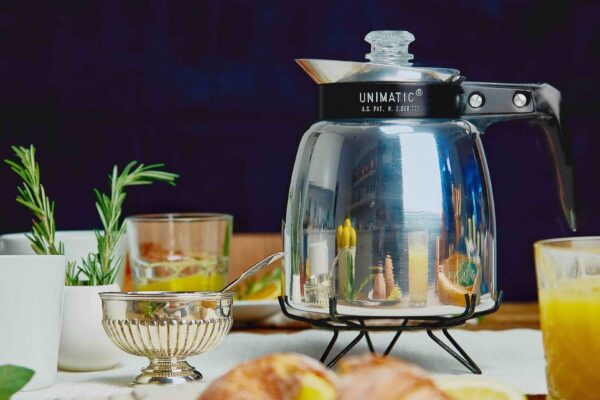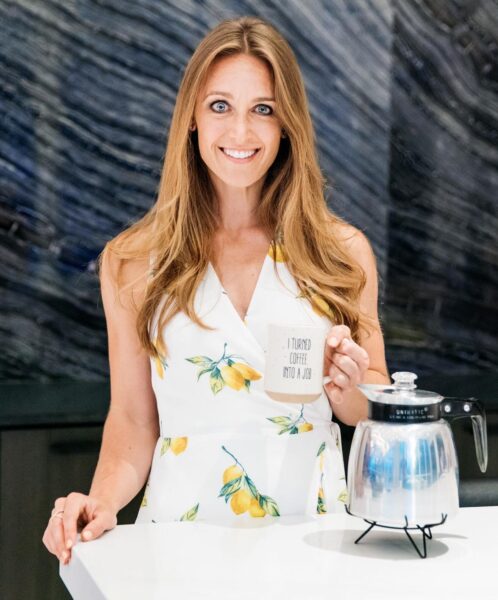Her story is a love story. And it all begins with her father.
Peter Cardiello, born and raised in San Pietro al Tanagro, a small town in Southern Italy, came to America in the mid 1940s and settled in Bay Ridge, in Brooklyn, NY. An entrepreneur, he started a stainless-steel cookware company and in the 1950s, decided that it needed to tackle the taste problem of American coffee. He wanted Americans to experience coffee the way Italians experience coffee. So through the research of his company, United Cookware, the world’s only automatic drip-percolator – The Unimatic – was born.
For Elisabeth, the Unimatic was much more than just a coffee pot. It was a talisman of her earliest memories as a child, engaged in and fascinated by the conversations her family had over the years, around the dinner or breakfast table, all with a pot of coffee – The Unimatic – front and center.
“The conversations that we had around our table – as a family with my dad – happened because of the way the Unimatic coffee pot functions. It maintains the temperature of the coffee, on its own. So we’d consistently say ‘oh, and there’s a bit more coffee left, just stay and finish the pot… just twenty more minutes.’ We would linger for hours.”
As young girl, an only child, Elisabeth never wanted those conversations to end. She often tells the story of how her father made her business cards from the paper stock of the company. Owner. At six years old, her father had made her owner of the business. How proud he was. And how that made her feel, confident that she was making her father proud.
Elisabeth went on to study international business and art, graduating summa cum laude from Wagner College, a liberal arts school with a long history on Staten Island, NY.
She then received her MBA in Management and graduating at the top of her class, she accepted a job offer at an investment bank and then at a hedge fund in midtown in New York. Although she says she learned a lot, she felt wildly unfulfilled, as she said, “waiting for that light bulb moment when I’d be clear about what I wanted to create.”
Then, on Thursday, September 30th, 2010, everything changed. Peter Cardiello – her father – passed unexpectedly. Over the years, her father had battled high blood pressure, heart problems and aortic aneurysms. The family had lived through their share of surgeries and hospital stays, but nothing had prepared them for this. What the family thought would be a seemingly simple routine surgical procedure became a 14 hour operation from which Peter would never recover. The family was devastated. Elisabeth’s world, upside down. Her father, gone.
For months, she worked to make sense of her father’s affairs, cleaning out his office, sorting through papers and inventory. The 26-year-old had now found herself thankful that she had started her career in the finance industry. It gave her the knowledge and experience to take on the responsibility of sorting out the family’s affairs.
Then, almost two years to the day, on Monday, October 29, 2012, Hurricane Sandy hit the Cardiello family home on Staten Island and left it underwater, quite literally. As Elisabeth recounts, “the ocean was in our living room.” Like her father’s passing, it was a complete shock to the system. Already challenged by what had happened only twenty-four months prior, Elisabeth had to quickly address the changing environment. She immediately moved back to Staten Island from midtown New York, and helped her mom rebuild. Now it seemed like all had been set adrift.
What would be her response?
As she describes it, it was in a moment where she had almost finished cleaning out her dad’s offices when she discovered a room filled with inventory. Expecting the inventory closet to hold a few remaining pieces of a leftover cookware company, Elisabeth realized that the door led, not to a closet at all, but to an entire room, a warehouse filled with five thousand of the drip-percolators her father had manufactured in Italy back in the 1960s, all sitting just beyond a door that she’d walked past since childhood.
In that moment, whatever had been, was no longer. Flashbacks of her mornings spent around the breakfast table with her dad came rushing in, The Unimatic sitting in the center of the table. It was all that was needed to stop her in her tracks.
Every Unimatic represented a moment that she could give to another family. She thought if she could build a company that brought people together, around their tables, for similar conversations, just like the moments she had shared with her father, she would forever pass on his legacy.
“When I realized how many Unimatics there were, pictures flashed before my eyes and I had the knowing that ‘this coffee pot is what gave you the opportunity to know who you are and to have the conversations that gave you your confidence and your resilience. This coffee pot invited the conversations that made you feel like more was possible.’ The thought of being able to give that opportunity to even just 5,000 other families, even if I added nothing else to it, I was in. I didn’t know a thing about coffee, but giving that opportunity to spend a bit more time around the table, over coffee just felt too important to pass up.”
And so it was the genesis of the Caffé Unimatic coffee company. In the moment when Elisabeth was most open, most available to receive, to hear, to see the opportunity in front of her, Caffé Unimatic had sprung roots. As her father had always said to her growing up, “What the mind can conceive, the mind can achieve.”
That was nearly a decade ago.





No comments